HOME >> PHOTOS
Religious service held to mark 75th anniversary of Nanjing Massacre
Source:Xinhua Published: 2012-12-13 16:33:47
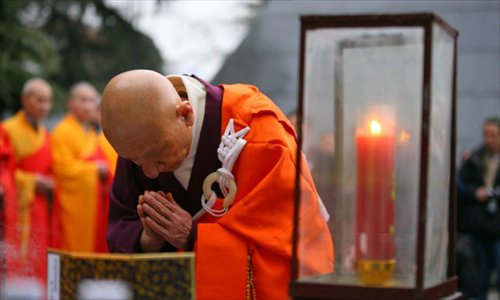
A Japanese monk prays in front of a memorial wall on which names of the Nanjing Massacre victims are engraved, during a religious service at the Memorial Hall of the Victims in Nanjing Massacre by Japanese Invaders in Nanjing, capital of east China's Jiangsu Province, December 13, 2012, to mark the 75th anniversary of the Nanjing Massacre. Nanjing was occupied on December 13, 1937, by Japanese troops who began a six-week massacre. Records show more than 300,000 Chinese unarmed soldiers and civilians were killed. Photo: Xinhua
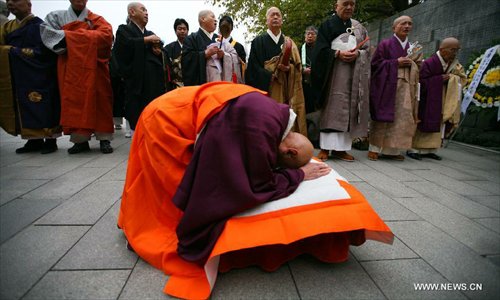
Japanese monks pray in front of a memorial wall on which names of the Nanjing Massacre victims are engraved, during a religious service at the Memorial Hall of the Victims in Nanjing Massacre by Japanese Invaders in Nanjing, capital of east China's Jiangsu Province, December 13, 2012, to mark the 75th anniversary of the Nanjing Massacre. Nanjing was occupied on December 13, 1937, by Japanese troops who began a six-week massacre. Records show more than 300,000 Chinese unarmed soldiers and civilians were killed. Photo: Xinhua
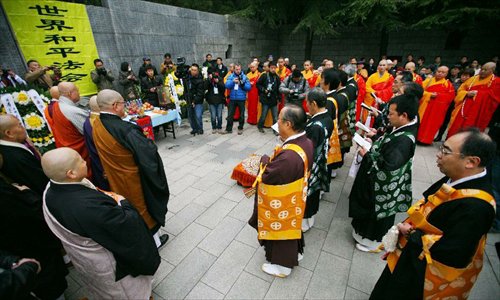

Chinese and Japanese monks attend a religious service at the Memorial Hall of the Victims in Nanjing Massacre by Japanese Invaders in Nanjing, capital of east China's Jiangsu Province, December 13, 2012, to mark the 75th anniversary of the Nanjing Massacre. Nanjing was occupied on December 13, 1937, by Japanese troops who began a six-week massacre. Records show more than 300,000 Chinese unarmed soldiers and civilians were killed. Photo: Xinhua
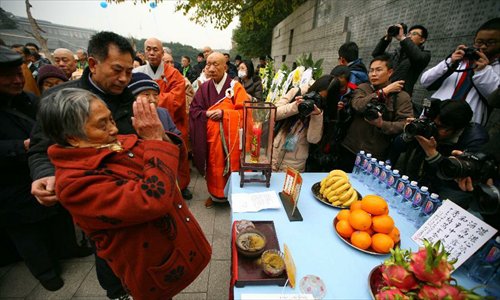

A Nanjing Massacre survivor (L, front) attends a religious service at the Memorial Hall of the Victims in Nanjing Massacre by Japanese Invaders in Nanjing, capital of east China's Jiangsu Province, December 13, 2012, to mark the 75th anniversary of the Nanjing Massacre. Nanjing was occupied on December 13, 1937, by Japanese troops who began a six-week massacre. Records show more than 300,000 Chinese unarmed soldiers and civilians were killed. Photo: Xinhua
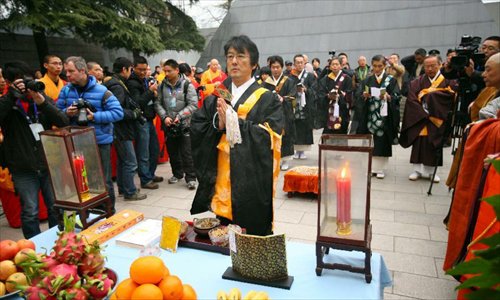

A Japanese Buddhist follower mourns the victims in front of a memorial wall on which names of the Nanjing Massacre victims are engraved, during a religious service at the Memorial Hall of the Victims in Nanjing Massacre by Japanese Invaders in Nanjing, capital of east China's Jiangsu Province, December 13, 2012, to mark the 75th anniversary of the Nanjing Massacre. Nanjing was occupied on December 13, 1937, by Japanese troops who began a six-week massacre. Records show more than 300,000 Chinese unarmed soldiers and civilians were killed. Photo: Xinhua
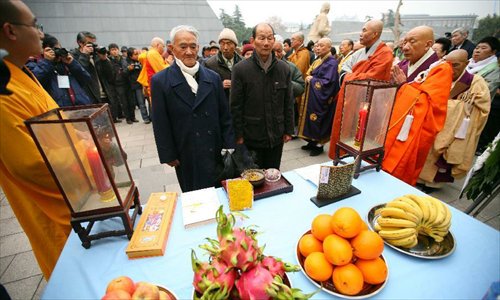

Nanjing Massacre survivors attend a religious service at the Memorial Hall of the Victims in Nanjing Massacre by Japanese Invaders in Nanjing, capital of east China's Jiangsu Province, December 13, 2012, to mark the 75th anniversary of the Nanjing Massacre. Nanjing was occupied on December 13, 1937, by Japanese troops who began a six-week massacre. Records show more than 300,000 Chinese unarmed soldiers and civilians were killed. Photo: Xinhua
Posted in: China